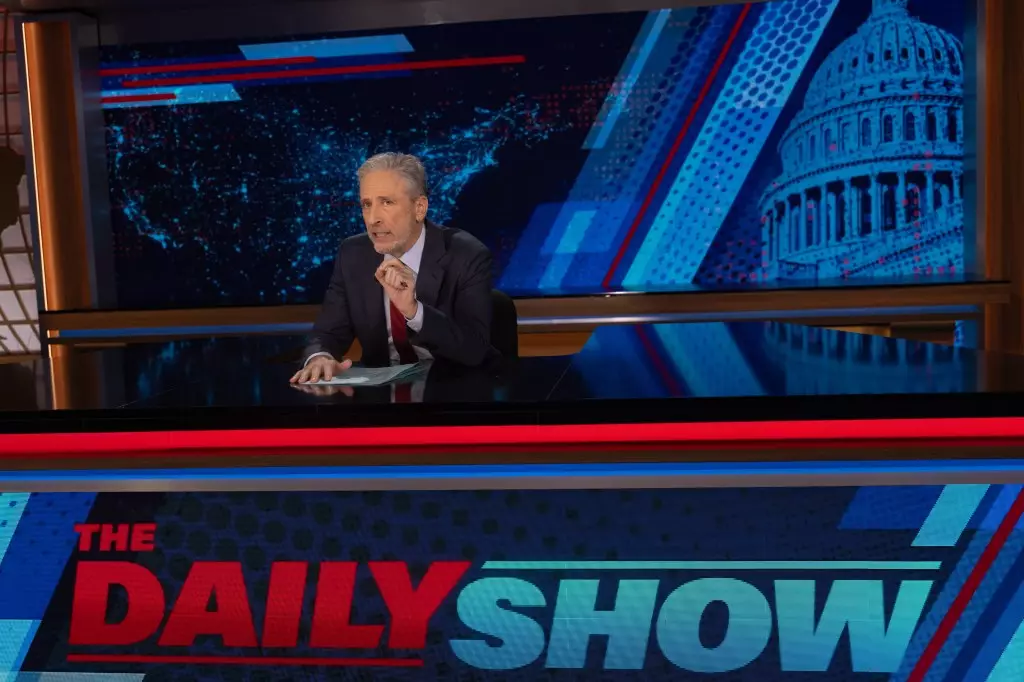Jon Stewart’s recent episode of *The Daily Show* epitomizes a unique fusion of humor and a sharp critique of the political atmosphere, particularly within the Democratic Party. In a landscape characterized by unease and uncertainty, Stewart’s opening remarks harnessed the palpable anxiety permeating the airwaves, particularly among Democrats. By addressing the audience’s tension directly, he effortlessly blended entertainment with substantial commentary, proving that laughter can coexist with serious topics.
Stewart’s approach signals an astute awareness of the role comedy plays during crises. By stating that viewers’ anxiety contributes positively to ratings, he highlights the marketability of discomfort — a facet often overlooked in the realm of political discourse. His insight resonates with audiences who seek an escape from the overwhelming narratives of electoral tension. This clever manipulation of anxiety not only boosts viewership but also creates a space for dialogue, framing discomfort as a collective experience shared across the nation.
In the segments that followed, the contributions of Troy Iwata, Grace Kuhlenschmidt, and Jordan Klepper added layers to this discourse. Each presented various shades of the political landscape, with Iwata’s comedic portrayal of the Trump campaign as a “garbage outfit.” This metaphor captures the disillusionment many feel towards political figures and their perceived failings. Iwata’s quip about the audience’s eagerness for chaos succinctly encapsulates a sentiment that transcends mere political allegiance. The audience is left grasping for clarity amidst a deluge of misinformation and sensationalism.
As Stewart enlivened the atmosphere with humor, he simultaneously engaged in a critical examination of the potential political fallout following major elections. His interaction with Iwata serves to underscore a growing norm among diverse political factions: regardless of electoral outcomes, dissent remains poised to erupt, manifesting in forms that could echo past protests. By joking about the whimsical yet alarming notion of individuals “taking a shit on Nancy Pelosi’s desk,” Stewart invites the audience to reflect on the erosion of civility in political discourse—trivializing a situation that is, in reality, fraught with tension.
The unexpected absence of Senator John Fetterman, who was to appear as a guest, epitomizes the unpredictable world of politics. His substitution by Arizona Governor Katie Hobbs speaks to an ever-shifting political record where states draw their narratives while stirring speculation. Hobbs’ optimism amidst uncertainty raises questions about the balance between hope and realism in political strategy—a notion that resonates far beyond the state borders and speaks to the collective sentiment of a divided electorate.
Stewart’s clever integration of jest and earnestness serves to provide his viewers with a rare platform to navigate their anxieties regarding contemporary political climates. While his humor garners laughs, it also functions as an important lens through which audiences can process their concerns about democracy and governance. In these times of fervent discontent, programs like *The Daily Show* remind us that laughter is not just a remedy; it can also be a potent vehicle for critical reflection and unified action amidst chaos. As we face uncertainty in our political landscape, Stewart exemplifies how comedy remains an invaluable tool for engagement and understanding—a reminder that even during tumultuous periods, there exists space for reframing dialogues through humor.
